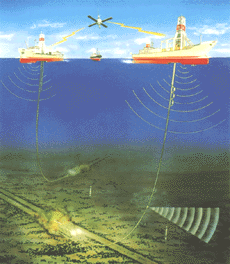Japan and the U.N. Convention Law of the Sea
Japan's Contribution to the Adoption of
the U.N. Convention on the Law of the Sea

Courtesy of the United Nations Information Centre, Tokyo
Drafting a comprehensive convention providing for legal order of the sea had been one of the United Nations' top priorities since its establishment. The U.N. Convention on the Law of the Sea was adopted in 1982 as the product of three rounds of the U.N. Conference on the Law of the Sea beginning in 1958. The Convention entered into force in November 1994.
The Convention is a comprehensive international agreement governing a wide range of maritime matters, including territorial sea and contiguous zone, straits, exclusive economic zone, continental shelf, high seas, deep sea-bed (the Area), protection and preservation of the marine environment, marine scientific research and settlement of disputes. The Convention also provides for the establishment of international organizations like the International Sea-Bed Authority, through which activities of exploration for and exploitation of the mineral resources of the deep sea-bed are organized and controlled, and the International Tribunal for the Law of the Sea for settlement of disputes.
The sea-girded Japan, having vital interests in the maintenance of global maritime order, actively participated in the U.N. conferences and made significant contribution to the adoption of the Convention.
Message from the Minister for Foreign Affairs

The U.N. Convention on the Law of the Sea was signed after many years of international discussion and cooperation with the aim of establishing a stable maritime legal order in the world. Japan, a maritime nation, believes that this Convention is of great significance to the international community, and is determined to play an active part in achieving its objectives and ensuring its steady implementation.
Yukihiko Ikeda
Japan as a Maritime Nation
Shipping
Shipping Japan has long been a major country in international shipping. In 1994, the nation's exports and imports of goods accounted for 18.5% in tons and 21.4% in ton-miles, respectively, of the world's volume of maritime cargo transport.
As one of the largest maritime nations, Japan has been playing a central role in international efforts to ensure safety of navigation by the International Maritime Organization (IMO).
Fishery
The fisheries sector is an important industry for Japan. As a country with major interests in fishery, Japan has been constantly paying keen attention to the conservation and management of marine living resources, and has been contributing vigorously to the formulation and implementation of international conservation and management measures.

Source: Ministry of International Trade and Industry
Development of Deep Sea-bed Resources
Remaining untapped in the deep sea-bed are resources that are highly valuable to mankind, such as manganese nodules that contain rare metals. The Convention defines the deep sea-bed and its resources as the "common heritage of mankind." To control exploration and exploitation of the deep sea-bed resources, the International Sea-Bed Authority has been established. As a member of the Council of this organization, Japan contributes to its effective operation.
Japan is assuming a leading role in the field of development of marine mineral resources. In particular, it has been engaged in pioneer activities at a mining area southeast of Hawaii. A specially designed research vessel, the HAKUREI-MARU NO. 2 is operating for prospecting in the area. In addition, Japan is developing deep sea-bed mining technology.
Preservation of the Marine Environment
Effective measures for the prevention of pollution of the marine environment can only be achieved through coordinated efforts by the nations around the world. Japan actively joins such international efforts to prevent pollution of the marine environment as have been conducted by the IMO and the United Nations Environment Programme (UNEP).
Back to Index
